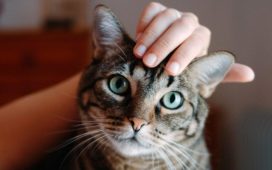Buying a lion cub as a pet is abusive, illegal, and extremely dangerous, said a Western Cape lion rescue expert after the discovery of a cub at a house in the Cape Town suburb of Athlone.
“After the Lion King movie, it seems cute and appealing to people, but it is the last animal you should choose as a pet,” said Drakenstein Lion Park managing director Paul Hart.
PIC | Lion cub found in house in Cape Town suburb
He explained that, by the time the cubs were three months old, they were “boisterous and destructive”, but by six months old, they were quite capable of killing a human being.
“This an apex predator we are talking about,” said Hart.
On Wednesday, police swooped on a house in Athlone to confiscate a cub and take two men in for questioning.
Police believe the cub had been brought to Cape Town from Thabazimbi, and have not elaborated further on who it belonged to or what the outcome of their questioning was.
READ | ‘It’s becoming a tourist’ – Escaped Karoo Park lion takes down 5 sheep near Sutherland
Several pictures of privately-owned lion cubs were sent to News24 by a person who wanted to remain anonymous. Several suggested owners were also called to establish if it was their animal, but all denied having a lion cub.
The Drakenstein Lion Park, which has massive enclosures for rescued big cats from around the world, posted on Facebook that they were worried whether the Athlone lion cub was in a suitable “place of safety”, and offered to help at their facility near Paarl.
READ | Fatal lion attack: Family ‘at peace’ after man killed by his ‘children’
Hart said that, as Cites animals, cubs may not be sold as pets, but that a market for cubs did exist.
The Convention on International Trade in Endangered Species of Wild Fauna and Flora (Cites) is an agreement between governments to control the trade in certain species.
The African lion (Panthera leo) is listed on Appendix 1 on Cites (Convention on the International Trade in Endangered Species), which means it is the on the list of the most endangered among Cites-listed animals and plants and threatened with extinction.
“They [lions] are kept more as status symbols or props to make the owner seem more manly or macho,” Hart added.
“At the same time, you will have an apex predator walking around your living room.”
READ | Abused lion from Spain makes her home in SA, meets a friend
Inevitably the cubs have to be removed from the home as they become more dangerous.
“We have rescued dozens and dozens of lion cubs,” said Hart.
“People think, ‘I want it, I want it,’ and are not thinking of the long-term consequences.
“Psychological abuse is the hardest to fix,” he said.
‘We try to let them be lions’
By the time they were rescued or surrendered by owners who can’t cope with them as they grow, they had to be weaned off whatever drugs they were given to stay docile, or they had suffered psychological abuse from being ordered around the house.
They may also have been physically abused, such as recent arrivals at the sanctuary: A rescued lion from Lebanon which had been chained up in a concrete room, and a tiger from a zoo in Argentina.
Once brought to the sanctuary, cubs are not treated as “cute”.
“We don’t do the cute thing, we try to let them be lions.”
Hart noted that each province had its own permit requirements for wild animals, but that the Western Cape was one of the strictest.
The sanctuary was hoping that the Athlone cub was at a proper rescue centre, and has also offered to help with its care.
“This is not an animal that is a pet. It’s a predator,” he said. “We want to make sure it is looked after properly.”
GET THE NEWS at your fingertips and download the News24 app for Android here now. Get it for your iPhone here.
KEEP UPDATED on the latest news by subscribing to our FREE newsletter.
– FOLLOW News24 on Twitter












